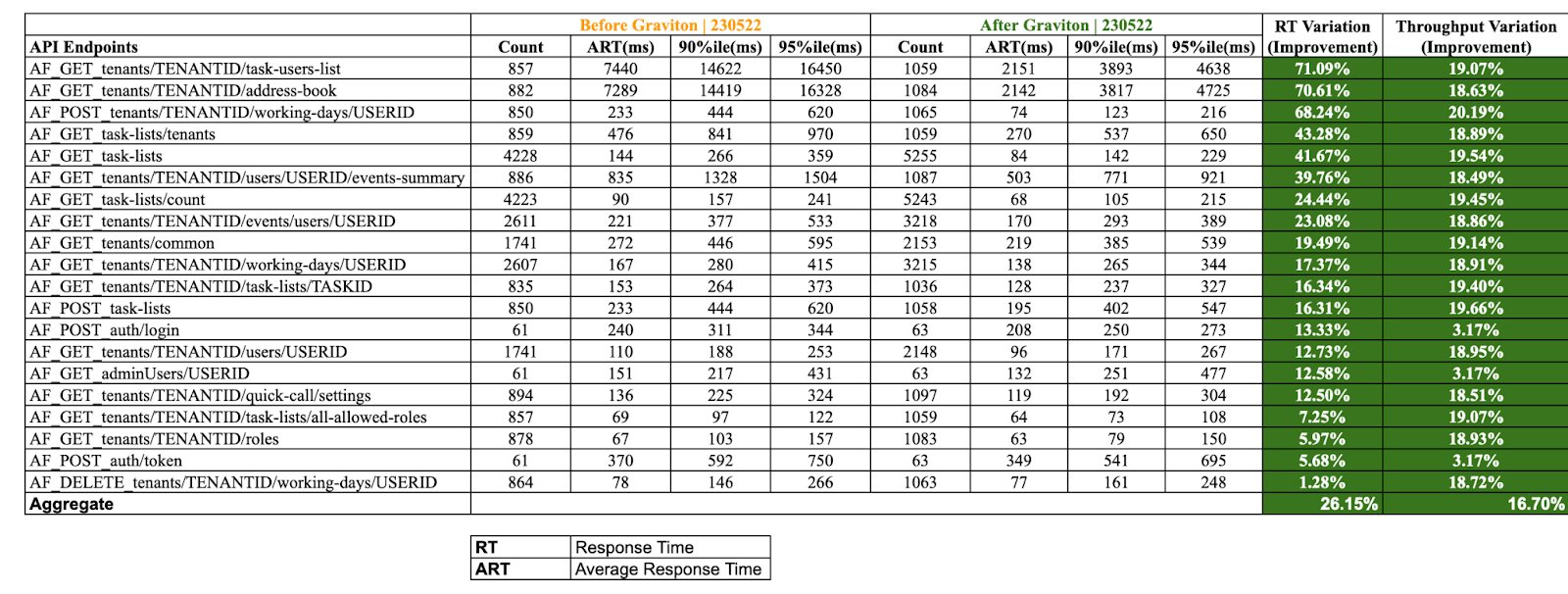Introduction
The Need for Reliability, Performance, and Cost Efficiency
Virtual care applications play a crucial role in providing convenient access to healthcare services. For Telescope Health, ensuring reliable and high-performing technology solutions was paramount to their mission of reducing barriers to care. SourceFuse recognized the potential of Graviton processors to optimize both reliability and cost efficiency. With AWS Graviton processors offering a 40% better price-to-performance ratio compared to x86 architecture, SourceFuse saw an opportunity to enhance the virtual care application’s performance while reducing operational costs. This alignment of goals prompted SourceFuse to explore the adoption of Graviton processors and leverage their benefits to achieve superior outcomes for Telescope Health.
Load Testing: Assessing Application Performance and Scalability
To assess the existing virtual care application’s performance and identify potential areas for improvement, SourceFuse embarked on a comprehensive load testing process. Load testing involved simulating realistic user scenarios, generating peak loads, and measuring key performance metrics such as response time and throughput. The testing process also evaluated the application’s scalability by subjecting it to increasing workloads to ensure it could handle future growth and user demands.
During load testing on the virtual care application running on x86 architecture, SourceFuse carefully monitored performance metrics and identified performance bottlenecks. This analysis helped pinpoint areas where improvements could be made to enhance the application’s responsiveness and scalability. The load testing process served as a crucial benchmark for comparing the performance of the application before and after migrating to Graviton processors.
Migrating ARC Microservices to AWS Graviton
Buoyed by the promising results of the load testing, the next step was to conduct the successful proof of concept (PoC). For this phase, SourceFuse migrated the ARC microservices – a critical component of the virtual care application – to Graviton processors. This migration required meticulous planning and execution to ensure a smooth transition with zero downtime and validate the feasibility of adopting Graviton processors for the entire application.
SourceFuse carried out extensive testing and validation of the ARC microservices on Graviton processors. The team ensured compatibility, performance optimization, and seamless integration with the application’s other components. The successful migration PoC of the ARC microservices demonstrated the ability to leverage Graviton processors effectively and laid the foundation for further enhancements.
Optimizing Performance: Load Testing Post-Migration
Following the successful migration of the ARC microservices to Graviton processors, SourceFuse conducted another round of comprehensive load testing to measure the impact on performance, responsiveness, and scalability of the virtual care application.
The load testing process involved simulating various user scenarios and generating peak loads to stress-test the application. SourceFuse closely monitored performance metrics, including response time and throughput, to evaluate the performance improvements achieved through the migration.
The results of the load testing on the Graviton architecture were highly encouraging, showcasing remarkable performance gains in the virtual care application. Specific API endpoints demonstrated significant improvements, with some experiencing response time improvements as high as 71%. This enhancement translated into a more seamless user experience, allowing patients to access healthcare services with greater efficiency.
Additionally, the throughput of certain API endpoints saw notable improvements, with increases of up to 20%. This increased throughput capacity enabled the application to handle a larger number of concurrent users effortlessly, ensuring uninterrupted access to healthcare resources.
On average, the application achieved an impressive 26% reduction in average response time across various API endpoints. This improvement significantly enhanced the application’s responsiveness and contributed to a smoother user experience.
Moreover, the average throughput increased by approximately 16.7%, further bolstering the application’s ability to accommodate growing user demands. The improved throughput capacity ensured that patients could seamlessly interact with healthcare providers and access vital services without delays.
These test results highlight the substantial performance gains achieved through the migration to Graviton processors. By leveraging the power and efficiency of Graviton architecture, the virtual care application achieved significant improvements in response time and throughput, ultimately enhancing patient satisfaction and enabling more efficient healthcare delivery.
Cost Savings: Leveraging Graviton for Efficiency
One of the key advantages of adopting Graviton processors was the potential for cost savings. Graviton processors offered a better price-to-performance ratio compared to traditional x86 architecture, enabling Telescope Health to optimize their infrastructure costs without compromising performance.
By migrating the virtual care application to Graviton processors, SourceFuse helped Telescope Health achieve significant cost savings. The reduced resource consumption and improved efficiency of the application running on Graviton processors translated into tangible financial benefits.
Conclusion
The collaboration between Telescope Health and SourceFuse in migrating the virtual care application to AWS Graviton processors exemplifies their commitment to innovation, reliability, performance, cost optimization, and sustainability. By leveraging cutting-edge technologies and adhering to the AWS Well-Architected Framework Review, SourceFuse successfully achieved remarkable performance improvements. The enhanced responsiveness, scalability, and cost savings delivered by the virtual care application demonstrate its transformative impact on seamless, efficient, and cost-effective care delivery. With a focus on sustainability, SourceFuse minimized the environmental impact of their work, further highlighting their dedication to driving positive change in the healthcare industry.
